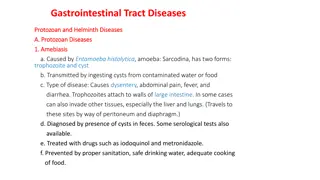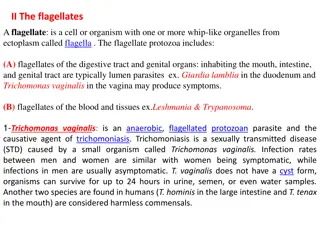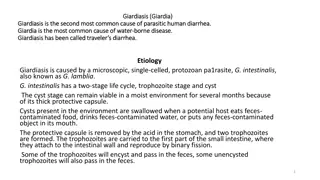Comprehensive Overview of Gastrointestinal Tract Diseases
This detailed guide covers various gastrointestinal tract diseases caused by protozoa and helminths, including amebiasis, giardiasis, pinworm infestation, and trichinosis. It discusses their causes, symptoms, transmission, treatment, and prevention methods. The content provides insights into the lif
0 views • 9 slides
Overview of Giardia lamblia Parasite and Giardiasis Disease
Giardia lamblia, also known as Giardia intestinalis, is a flagellated parasitic microorganism that causes giardiasis by colonizing the small intestine. It infects humans, cats, dogs, and birds, and is a common parasitic human disease globally. Giardiasis, popularly known as beaver fever, can lead to
0 views • 12 slides
Overview of Flagellates and Their Clinical Significance
Flagellates are single-celled organisms with whip-like flagella that can cause parasitic infections in humans. Key species like Trichomonas vaginalis, Trichomonas hominis, and Giardia lamblia are discussed, highlighting their clinical implications, diagnostic methods, and treatment options.
0 views • 11 slides
Understanding Giardiasis: Causes, Symptoms, and Prevention
Giardiasis, caused by the parasite Giardia intestinalis, is a common diarrheal illness in humans and animals. It spreads through fecal-oral transmission and can be highly contagious. Symptoms include diarrhea, nausea, cramps, and fatigue. Young children and those in certain risk groups are more susc
2 views • 9 slides
Understanding Giardia: Morphology, Life Cycle, and Pathogenesis
Giardia is a protozoan parasite that causes chronic diarrhea in various hosts, including humans and animals. This parasite has unique morphology with trophozoite and cyst stages. Its life cycle involves direct reproduction through binary fission and transmission through contaminated food or water. G
0 views • 19 slides




